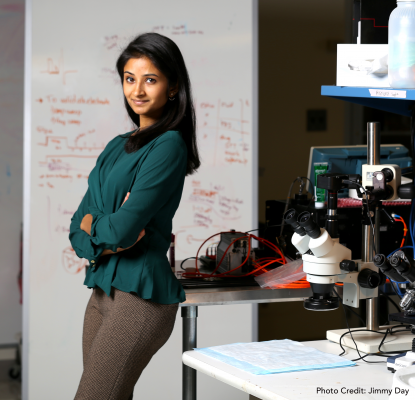Shriya Srinivasan
Shriya Srinivasan is a Schmidt Science Fellow and Junior Fellow at the Harvard Society of Fellows. She is currently pursuing postdoctoral research at the Langer Lab at the Massachusetts Institute of Technology (MIT). She was previously a graduate student in the MIT Biomechatronics group within MIT’s Media lab. Her inventive work seeks to restore sensation and mobility to patients who have lost neural control due to the loss of a limb. She believes that functional restoration is vital to an individual’s independence and mobility. Her passion to improve prostheses originated when watching her friend struggle to perform a simple task with a prosthetic arm. Shriya observed how the prosthetic device was not communicating with her friend’s body and decided she wanted to create an invention that would allow those with prosthetic limbs, like her friend, to experience a sense of touch.
Shriya developed the Cutaneous Mechanoneural Interface, a new composite tissue that is surgically connected to a skin flap in the residual limb and activated through an electrical stimulation system. The interface generates and transmits nerve signals that represent touch and vibratory sensation. Shriya’s additional inventions include the regenerative Agonist-antagonist Myoneural Interface, which is a surgical technique that help patients with prostheses gain better mobility and sense of body position. Shriya received the 2020 $15,000 “Cure it!” Lemelson-MIT Student Prize for her portfolio of inventions, which she hopes will enable amputees to return to the workforce with greater abilities and improved quality of life.
Shriya’s parents immigrated to the U.S. from India with a strong desire for their daughter to pursue the best education. She grew up in Strongsville, Ohio, and enrolled as an undergraduate in biomedical engineering at Case Western Reserve University, where she noticed a disconnect between biomedical devices and their clinical use. She wanted to better understand the relationship between human physiology and therapeutic and assistive devices, so she continued her studies at the Harvard-MIT Health Sciences and Technology Program where she currently takes medical courses and performs clinical work at Harvard Medical School.
Shriya is passionate about youth mentorship and increasing the engagement of young people in STEM (Science, Technology, Engineering and Math), especially among the underrepresented. She has taught design thinking and empowered individuals to practice impactful innovation during her tenure as a co-director of the MIT Hacking Medicine program.
Shriya’s list of achievements include multiple fellowships and awards, 19 publications, five patents, and invitations to speak at hospitals, universities, panels, and conferences. In her spare time she performs as a Carnatic vocalist and Bharathanatyam dancer.
Related Articles
The Boston Globe
MIT News


